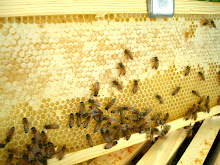After seeing how active the bees are and how full the two brood boxes have gotten, I decided it was time to stop feeding the bees. No more sugar water for you, girls! Note to self: stopped feeding on June 15.) I've spotted lots of young bees, so the colony is obviously growing.
Tim suited up and went with me this morning to put on another super. He manned the smoker while I opened the hive. I lifted one frame on the edge of the second box to inspect and it was so heavy! Most of the weight appeared to come from stores of sugar water, but the middle frames are heavy with capped brood. After replacing the frame, I added a queen excluder and another super for honey, and then closed the hive.
It's amazing how much conflicting information is out there about how to manage a hive. So many beekeepers and bee experts advise against using a queen excluder, but there seem to be an equal number who advocate it. Although there is a possibility that I won't harvest any honey this first year (again, some experts say no, some say yes and some say maybe), my reasoning is that if I DO harvest some, I'd like the frames to be brood-free and filled with honey only. The only way to ensure that is to keep the queen out of the honey supers.
My friend and fellow beekeeper Drea phoned this week to say that her hives (now in their second year) are already producing honey in mid-June. The hive with the "aggressive" personality is particularly productive. She'll be harvesting in the next week or two. That's exciting!
Many people have cautioned me that having only one hive could be a mistake. Yet my one hive seems to be thriving. So, maybe there is no right or wrong, or at least more than one way to "bee" successful. Or maybe I'm just lucky with this colony. Time will tell.
ADDENDUM: This evening the bees were clustered in droves on the front of the hive and I was worried they might swarm. After consulting my beginner's beekeeping book, I removed the queen excluder to allow the bees the space of a third super for brood. This was not a fun task in the 92-degree heat, but I'm glad I did it. The bees are already headed back inside to do what they do best.


 I could hear the humming in the two brood supers below — it's a distinctly "busy" hum, pleasant to hear. Pulling out a couple of frames in the third box, I can see that the bees are starting to build out comb and store some pollen.
I could hear the humming in the two brood supers below — it's a distinctly "busy" hum, pleasant to hear. Pulling out a couple of frames in the third box, I can see that the bees are starting to build out comb and store some pollen. 


